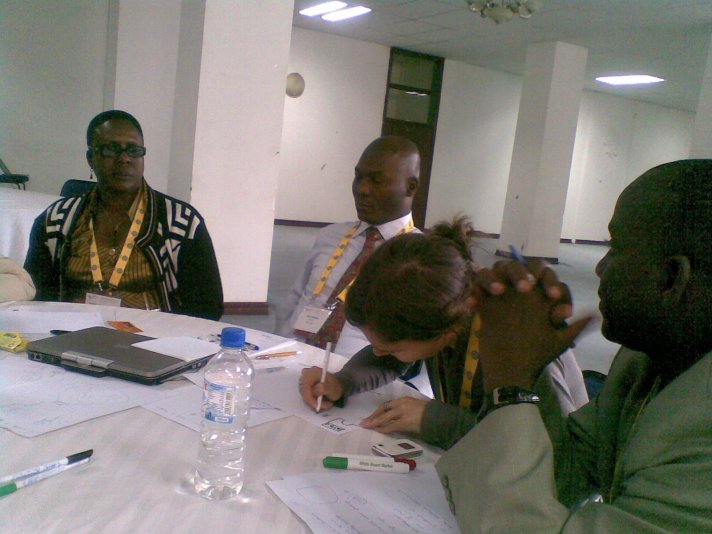Day 1 – A Participatory Design workshop on Mobile Learning for Development
Niall Winters & Yishay Mor, London Knowledge Lab, UK
Caroline Shakwei Sawe Mbindyo, AMREF, Kenya
Roger and I walked in on this session by accident. The pre-conference events were meant to be registered for but because of the swell of people at the registration counter they allowed everyone to proceed to the events without registration.
This workshop aimed to provide participants with the capacity to design mobile learning activities. We were challenged to focus not on the technologies themselves but the social practices around them. We were reminded that not only is the device mobile, but also that people and information are mobile as well. This presents the challenge of a constantly shifting context, which presents the central constraint in mobile learning. We were tasked with using design scenarios to identify potential solutions to real problems in real contexts, thereby not starting with the technology but by starting with real problems to address.
In our groups we shared issues in our context which could be addressed with m-learning. We had members from Côte d’Ivoire, Nigera, Zambia, Switzerland, and South Africa. Once we had identified a specific issue to focus in on, we used the three hats method for exploration – one member to tell the story, one to take notes, and one to tell the story to the larger group. .
.
In our group we discussed the story of Dr. Boukari Souley, from the Abubakar Tafawa Balewa University in the northern region of Nigeria. The university faces a challenge in maintaining contact with students when they return to their homes in rural areas outside of the semester where they do not have access to computers. Students often do not know when they need to come and register, where to get their grades, etc. The mobile phone presents an opportunity to maintain contact with the students. The university has a well established learning and student management system, the challenge is to get that information to the students using devices they all have access to, the mobile phone (99% penetration in Nigeria) Some questions raised were the cost of using the mobile to access web or send sms’ and what content would be shared and made available on mobile.
We then used an activity called “Force Mapping” to explore the context in which the m-learning intervention might exist. The activity was to name the various forces at work in our context (organizations, people), map them on a worksheet and define the links which connect each force and identify a postitve or negative force implied.
In discussing the force map we started to think about various interventions which might be suitable for our situation. We were fortunate to have mobile guru Steve Vosloo with us for this activity and he helped us identify a number of mobile solutions for sharing information and collaborating via mobile. We discussed the implications of using MXIT, USSD, or simply SMS technology to connect with students in rural locations.
The next activity was to storyboard the implementation of a selected solution in context. Storyboarding allows us to “tell the story” of how the intervention will be experienced by the user and how it might affect their social practices.
We found that the experience in designing a mobile intervention using this methodology was quite useful.
1. Consider social practice of mobile use in context
2. Use design scenarios to identify potential solutions to real problems in real contexts
3. Construct force maps to flush out the various users, stakeholders, and agents within the context
4. Identify possible interventions
5. Construct storyboard to tell the story of how the intervention might be experienced by the user and how it might impact social practice.
Overall a great session on moblile learning. This ende up being one of my favorite sessions at eLearning Africa 2010 because it was not rushed and we had ample time to discuss issues and ideas with the other delgates.

